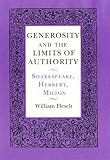Generosity and the Limits of Authority : Shakespeare, Herbert, Milton / William Flesch.
Material type: TextPublisher: Ithaca, NY : Cornell University Press, [2018]Copyright date: ©1992Description: 1 online resource (296 p.)Content type:
TextPublisher: Ithaca, NY : Cornell University Press, [2018]Copyright date: ©1992Description: 1 online resource (296 p.)Content type: - 9781501732867
- 820.9/353 20
- online - DeGruyter
| Item type | Current library | Call number | URL | Status | Notes | Barcode | |
|---|---|---|---|---|---|---|---|
 eBook
eBook
|
Biblioteca "Angelicum" Pont. Univ. S.Tommaso d'Aquino Nuvola online | online - DeGruyter (Browse shelf(Opens below)) | Online access | Not for loan (Accesso limitato) | Accesso per gli utenti autorizzati / Access for authorized users | (dgr)9781501732867 |
Browsing Biblioteca "Angelicum" Pont. Univ. S.Tommaso d'Aquino shelves, Shelving location: Nuvola online Close shelf browser (Hides shelf browser)

|

|

|

|

|

|

|
||
| online - DeGruyter This Thing of Darkness : Eisenstein's Ivan the Terrible in Stalin's Russia / | online - DeGruyter Political Survivors : The Resistance, the Cold War, and the Fight against Concentration Camps after 1945 / | online - DeGruyter Dramas, Fields, and Metaphors : Symbolic Action in Human Society / | online - DeGruyter Generosity and the Limits of Authority : Shakespeare, Herbert, Milton / | online - DeGruyter The German Predicament : Memory and Power in the New Europe / | online - DeGruyter Merlin : Knowledge and Power through the Ages / | online - DeGruyter The Nazi Movement in the United States, 1924–1941 / |
Frontmatter -- Contents -- Preface -- INTRODUCTION -- CHAPTER ONE. "When Griefs Make Thee Tame": Public and Private in Herbert -- CHAPTER TWO. Shakespeare's Gifts -- CHAPTER THREE. The Majesty of Darkness: Idol and lmage in Milton -- Index
restricted access online access with authorization star
http://purl.org/coar/access_right/c_16ec
Generosity is an ambiguous quality, William Flesch observes; while receiving gifts is pleasant, gift-giving both displays the wealth and strength of the giver and places the receiver under an obligation. In provocative new readings of Shakespeare, Herbert, and Milton, Flesch illuminates the personal authority that is bound inextricably with acts of generosity.Drawing on the work of such theorists as Mauss, Blanchot, Bourdieu, Wittgenstein, Bloom, Cavell, and Greenblatt, Flesch maintains that the literary power of Shakespeare, Herbert, and Milton is at its most intense when they are exploring the limits of generosity. He considers how in Herbert's Temple divine assurance of the possibility of redemption is put into question and how the poet approaches such a gift with the ambivalence of a beneficiary. In his readings of Shakespeare's Richard II, Henry IV, King Lear, Antony and Cleopatra, and the sonnets, Flesch examines the perspective of the benefactor—including Shakespeare himself—who confronts the decline of his capacity to give. Turning to Milton's Paradise Lost, Flesch identifies two opposing ways of understanding generosity—Satan's, on the one hand, and Adam and Eve's, on the other - and elaborates the different conceptions of poetry to which these understandings give rise.Scholars of Shakespeare and of Renaissance culture, Miltonists, literary theorists, and others interested in the relationship between philosophy and literature will want to read this insightful and challenging book.
Mode of access: Internet via World Wide Web.
In English.
Description based on online resource; title from PDF title page (publisher's Web site, viewed 26. Apr 2024)


